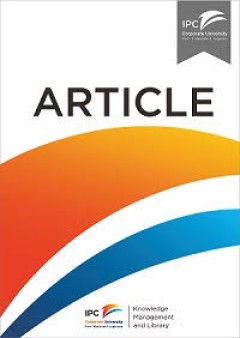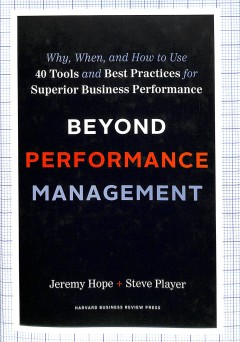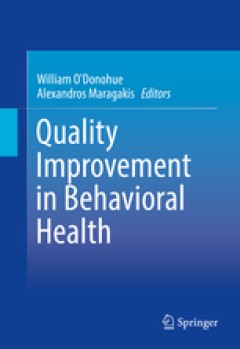Ditapis dengan

Total quality management (TQM)-an overview
- Edisi
- Vol. 17 Issue: 1, pp.15-19
- ISBN/ISSN
- -
- Deskripsi Fisik
- -
- Judul Seri
- The Bottom Line: Managing Library Finances
- No. Panggil
- ATC MG TAL t
- Edisi
- Vol. 17 Issue: 1, pp.15-19
- ISBN/ISSN
- -
- Deskripsi Fisik
- -
- Judul Seri
- The Bottom Line: Managing Library Finances
- No. Panggil
- ATC MG TAL t

Beyond performance management : Why, When, and How to Use 40 Tools and Best P…
There’s a bewildering array of management tools out there. And they all promise to help you excel at the toughest parts of your job: defining your organization’s strategic direction, managing customers and costs, and boosting workforce performance.But just 30 percent of these tools deliver as intended. Why? As Jeremy Hope and Steve Player reveal in Beyond Performance Management, while many…
- Edisi
- -
- ISBN/ISSN
- 978-1-4221-4195-3
- Deskripsi Fisik
- 387 p., ; 28 cm ; index
- Judul Seri
- -
- No. Panggil
- LC 658.31 HOP b

Lean Six Sigma for Dummies
Maximize the quality and efficiency of your organization If you want to make your organization or team more productive, you have to change the way it thinks. Combining the leading improvement methods of Six Sigma and Lean, this winning technique drives performance to the next level. But the jargon-packed language and theory of Lean Six Sigma can be intimidating f…
- Edisi
- 2nd ed.
- ISBN/ISSN
- 978-1-119-95370-8
- Deskripsi Fisik
- xvi, 300p. ; 24cm.
- Judul Seri
- -
- No. Panggil
- MG MOR l

RESEARCH AND CONCEPTS Components of successful total quality management
According to the literature, quality management consists of a set of components: critical factors, tools, techniques and practices. The purpose of this paper is: to identify the components of total quality management (TQM), in order to make them known to managers and thus facilitate successful quality management implementation, and to show the situation of 106 ISO 9000 certified firms concernin…
- Edisi
- Vol. 17 No. 2, 2005 pp. 182-194
- ISBN/ISSN
- 0954-478X
- Deskripsi Fisik
- 13P
- Judul Seri
- RESEARCH AND CONCEPTS
- No. Panggil
- ATC MG TAR c

Adopting quality management principles to revitalise the facilities maintenan…
The purpose of this paper is to review the total quality management (TQM) philosophy and the quality management principles (QMPs) in facilities management (FM), and presents the findings of a recent FM study at the Port Authority of Trinidad and Tobago (PATT).
- Edisi
- Vol. 11 No. 3, 2010 pp. 197-209
- ISBN/ISSN
- Asian Journal on Qua
- Deskripsi Fisik
- 16P
- Judul Seri
- Asian Journal on Quality
- No. Panggil
- ATC MG PUN a

Organisational performance improvement through quality award process particip…
The purpose of the study is to describe the activities initiated based on participation in a quality award process and with the intention to improve performance.
- Edisi
- Vol. 22 No. 9, 2005 pp. 894-912
- ISBN/ISSN
- 0265-671X
- Deskripsi Fisik
- 19 p.
- Judul Seri
- Organisational performance improvement through quality award process participation
- No. Panggil
- ATC MG ERI o C.1

Total quality management : the key to business improvement
- Edisi
- -
- ISBN/ISSN
- 978-94-011-1276-5
- Deskripsi Fisik
- xi, 188 p.
- Judul Seri
- -
- No. Panggil
- TXT MG PER t
- Edisi
- -
- ISBN/ISSN
- 978-94-011-1276-5
- Deskripsi Fisik
- xi, 188 p.
- Judul Seri
- -
- No. Panggil
- TXT MG PER t

Knowledge and cultural diffusion along the supply chain as drivers of product…
The purpose of this paper is to widen the knowledge base on supply chain learning by exploring and explaining how an enterprise can compete and win in the international market by integrating quality management practices along its supply chain and, above all, by becoming the coordinator in a supply chain learning (SCL) network.
- Edisi
- Vol. 23 No. 2, 2012
- ISBN/ISSN
- -
- Deskripsi Fisik
- 29 p.
- Judul Seri
- -
- No. Panggil
- ATC MG BIO k

Knowledge and cultural diffusion along the supply chain as drivers of product…
The purpose of this paper is to widen the knowledge base on supply chain learning by exploring and explaining how an enterprise can compete and win in the international market by integrating quality management practices along its supply chain and, above all, by becoming the coordinator in a supply chain learning (SCL) network.
- Edisi
- Vol. 23 No. 2, 2012
- ISBN/ISSN
- -
- Deskripsi Fisik
- 29 p.
- Judul Seri
- The International Journal of Logistics Management
- No. Panggil
- ATC LO NON k

Adopting quality management principles to revitalise the facilities maintenan…
The purpose of this paper is to review the total quality management (TQM) philosophy and the quality management principles (QMPs) in facilities management (FM), and presents the findings of a recent FM study at the Port Authority of Trinidad and Tobago (PATT).
- Edisi
- -
- ISBN/ISSN
- -
- Deskripsi Fisik
- 15 p.
- Judul Seri
- -
- No. Panggil
- ATC MG NUR a

Quality Management in Logistics: an Examination of Industry Practices
Purpose – The objective of the study is to examine the extent to which quality management practices, tools and methods are employed and adopted in Australian companies. Design/methodology/approach – To address the aim of the study, a survey instrument was developed and data were collected from a field research on a sample of manufacturing, retail, and logistics companies. Findings – T…
- Edisi
- Vol. 11 Iss 3 pp
- ISBN/ISSN
- 1359-8546
- Deskripsi Fisik
- 10 p
- Judul Seri
- Supply Chain Management: An International Journal
- No. Panggil
- ATC LO RAH q

The effects of technology and TQM on the performance of logistics companies
Total quality management (TQM) and technology are fast becoming essential features of business strategy for the success of many leading organizations in the world. More and more companies are using technology and adapting TQM for sustaining competitiveness in the marketplace. TQM works well for internal integration of logistics companies and they can benefit from the use of technology, includin…
- Edisi
- Vol. 36 No. 3, 2006
- ISBN/ISSN
- -
- Deskripsi Fisik
- 22 p.
- Judul Seri
- International Journal of Physical Distribution & Logistics Management
- No. Panggil
- ATC LO YIN t

The logistics services outsourcing dilemma: quality management and financial …
Logistics has become an essential service for synchronous companies. Many companies have recognized the potential benefits gained through a high quality system of logistics services, which are provided either internally or externally by a third party logistics company (3PL). The 3PL is positioned between the company and its customers, in a new-shaped logistics triad, having a crucial role in ha…
- Edisi
- Volume 15 · Number 6 · 2010 · 438–453
- ISBN/ISSN
- -
- Deskripsi Fisik
- 18 p.
- Judul Seri
- Supply Chain Management: An International Journal
- No. Panggil
- ATC LO VOU t

A supply chain diagnostic tool
How can a third-party logistics (3PL) provider decide whether or not there is a viable opportunity to serve the needs and desires of potential clients? To answer this question, a tool is needed that can help determine if there are problems, inefficiencies, or needed improvements in a client’s, or a potential client’s, supply chain that the 3PL can effectively address. Most diagnostic tools …
- Edisi
- Vol. 34 Iss 10 pp. 827 - 855
- ISBN/ISSN
- 0960-0035
- Deskripsi Fisik
- 31 p.
- Judul Seri
- International Journal of Physical Distribution & Logistics Management
- No. Panggil
- ATC LO FOG a

The state of quality in logistics: evidence from an emerging Southeast Asian …
The importance of the logistics function has increased dramatically at many firms as comparative priorities have shifted from production quality to delivery and flexibility. At the same time, however, there have been few comprehensive studies on the implementation of TQM practices in the logistics function. This paper examines the implementation of quality management practices in the logistics …
- Edisi
- Vol. 21 No. 4, 2004
- ISBN/ISSN
- -
- Deskripsi Fisik
- 17 p.
- Judul Seri
- International Journal of Quality & Reliability Management
- No. Panggil
- ATC MG MIL t

A quality management framework for seaports in their supply chains in the 21s…
For seaports to be competitive and sustainable in the long-term in a turbulent and hyper-competitive market, a re-examination of success factors, organizational structures, and management practices is required. As seaports have continued to evolve and become further integrated and embedded in their supply chains, the issue of ensuring quality management practices becomes of greater interest. T…
- Edisi
- Volume 27 Number 3
- ISBN/ISSN
- -
- Deskripsi Fisik
- 24 p.
- Judul Seri
- The Asian Journal of Shipping and Logistics
- No. Panggil
- ATC LO TRA a

Quality Management in the Logistics Function: An Empirical Study
The importance of the logistics function has increased dramatically at many firms as competitive priorities have shifted from cost and product quality to delivery and flexibility. At the same time, however, there have been few comprehensive studies of the implementation of TQM practices in logistics. This paper examines the application of quality management practices in the logistics functi…
- Edisi
- Vol. 16 Iss 2 pp
- ISBN/ISSN
- 0265-671X
- Deskripsi Fisik
- 18 p
- Judul Seri
- International Journal of Quality & Reliability Management
- No. Panggil
- ATC LO MIL q

The impact of interorganizational alliances in improving supplier quality
Examines the interorganizational alliance of a buyer and supplier with the expressed objective of improving the quality of existing purchased parts. Supplier quality can be improved through the implementation of various programmes such as statistical process control (SPC). Supplier quality improvement is viewed as two‐dimensional; there may be improvement owing to the modification of product …
- Edisi
- Vol. 24 Issue: 5, pp.15-23
- ISBN/ISSN
- -
- Deskripsi Fisik
- 12 p.
- Judul Seri
- International Journal of Physical Distribution & Logistics Management
- No. Panggil
- ATC LO ELL t

Quality management in a supply chain perspective: Strategic and operative cho…
Supply chain management (SCM) is conceived by academics and practitioners as either an extension of logistics or an all-encompassing approach to business integration. From the authors' point of view, SCM involves not only logistic activities but also other processes such as quality management. This paper seeks to understand how quality can be managed using a supply chain perspective and what th…
- Edisi
- Vol. 21 No. 4, 2001, pp. 446-460.
- ISBN/ISSN
- -
- Deskripsi Fisik
- 20 p.
- Judul Seri
- International Journal of Operations & Production Management
- No. Panggil
- ATC LO VIN q

Quality in logistics: a comparison of practices between Australian and North …
Presents a comparison of the findings of three studies conducted in North America/ Europe and Australia which investigated the adoption of quality management practices in the logistics function. Focuses on the extent to which quality practices are adopted, how quality in logistics is defined and administered, impediments to implementation, measurement of quality improvements, measuring customer…
- Edisi
- Vol. 29 No. 4, 1999, pp. 267-280.
- ISBN/ISSN
- -
- Deskripsi Fisik
- 16 p .
- Judul Seri
- International Journal of Physical Distribution & Logistics Management
- No. Panggil
- ATC LO SOH q

Meeting quality and cost imperatives in a global market
The complexity, uncertainty, and diminished control found in global operations hinder the development of world-class competencies. For example, as a firm rationalizes manufacturing, logistical challenges increase. As a result, cost advantages achieved through production sharing are often offset by higher logistics costs. This multi-method explores the cross-functional development of quality and…
- Edisi
- Vol. 30 No. 6, 2000, pp. 472-499
- ISBN/ISSN
- -
- Deskripsi Fisik
- 31 p.
- Judul Seri
- International Journal of Physical Distribution & Logistics Management
- No. Panggil
- ATC LO ROA m

Getting equipped for the twenty-first century
Asserts that developments in management of technology (MOT) deserve more attention than they currently receive in relation to management of quality. Argues that organisations, or groupings of organisations, that recognise the consumer potential of the new technologies, and learn how to deliver them, will be the total quality performers of the new millennium. Considers that the pace of technol…
- Edisi
- Vol. 11 Issue: 2, pp.80-88
- ISBN/ISSN
- -
- Deskripsi Fisik
- 11 p.
- Judul Seri
- Logistics Information Management
- No. Panggil
- ATC LO CHE g

Evaluating six sigma methodology to improve logistical measures of food distr…
The purpose of this paper is to investigate the implementation of the Six Sigma methodology as a systematic business strategy and quality initiative to improve the critical logistical measures within small-to-medium-sized food distributors.
- Edisi
- Vol. 25 No. 7, 2014 pp. 998-1027
- ISBN/ISSN
- -
- Deskripsi Fisik
- 31 p.
- Judul Seri
- Journal of Manufacturing Technology Management
- No. Panggil
- ATC LO NAB e

Diffusion of quality standards in the hospitality sector
The aim of this study is to compare the diffusion of certifications under two quality management systems (QMSs) in the tourism sector in Spain: the generic ISO 9001 international standard; and the Spanish industry-specific “Q” standard.
- Edisi
- Vol. 33 No. 5, 2013 pp. 504-527
- ISBN/ISSN
- -
- Deskripsi Fisik
- 26 p.
- Judul Seri
- International Journal of Operations & Production Management
- No. Panggil
- ATC LO BER d

Current perspectives in logistics: Turkey as a case study
The primary objective of this paper is to explore how the companies in Turkey plan, manage, carry out and improve their logistics processes and, thus, provide a preliminary analysis to explore the current status of logistics in Turkey. For this purpose, a structured-disguised survey was conducted with the top 250 firms of Istanbul Chamber of Commerce. The aims were: to specify the organizationa…
- Edisi
- Vol. 29 No. 1, 1999, pp. 22-49.
- ISBN/ISSN
- -
- Deskripsi Fisik
- 30 p.
- Judul Seri
- International Journal of Physical Distribution & Logistics Management
- No. Panggil
- ATC LO URA c

Contribution of quality management tools and practices to project management …
There is little empirical research that demonstrates a link between quality management practice and better project management performance. Some evidence to this effect is presented and analysed. Reviews two studies that examined the relationship between quality management practice and performance in two areas: manufacturing, and logistics. Next, data are analysed from a survey of project manage…
- Edisi
- Vol. 17 Nos4/5, 2000, pp. 571-583
- ISBN/ISSN
- -
- Deskripsi Fisik
- 15 p.
- Judul Seri
- International Journal of Quality & Reliability Management
- No. Panggil
- ATC LO RAZ c

Business excellence through total supply chain quality management
The purpose of this paper is to show how the quality practices such as leadership and strategic quality planning, supplier relationship management, customer focus, quality data and reporting, process management and human resource management are as relevant to supply chains as they are to an individual firm.
- Edisi
- Vol. 13 No. 3, 2012 pp. 309-324
- ISBN/ISSN
- -
- Deskripsi Fisik
- 18 p.
- Judul Seri
- Asian Journal on Quality
- No. Panggil
- ATC LO HAR b

A comparative study of performance evaluation based on field failure data for…
Food production lines consist of several machines in series, and for that reason if a failure occurs in a machine some or all of the in-process material upstream of the failure will have to be scrapped due to quality deterioration during the stoppage, therefore the necessity of better maintenance strategy is required. This paper aims to address this issue.
- Edisi
- Vol. 17 No. 1, 2011 pp. 26-39
- ISBN/ISSN
- -
- Deskripsi Fisik
- 16 p .
- Judul Seri
- Journal of Quality in Maintenance Engineering
- No. Panggil
- ATC LO TSA a

Utilizing RISKOptimizer to manage quality performance
New software products are now available that offer solutions to operational problems that could not be handled by traditional linear programming. The problem of quality performance described could previously only have been handled by writing a special purpose simulation program. Now it can be solved in a spreadsheet environment using Evolver and RISKOptimizer software. Evolver can identify a gl…
- Edisi
- Volume 14 . Number 3 . 2001
- ISBN/ISSN
- -
- Deskripsi Fisik
- 7 p.
- Judul Seri
- Logistics Information Management
- No. Panggil
- ATC LO WEI u

The effect of quality management on the service quality and business success …
The purpose of the paper is to analyse empirically the causal relationships between quality management, service quality and business success in German logistics companies.
- Edisi
- Vol. 27 No. 2, 2010
- ISBN/ISSN
- -
- Deskripsi Fisik
- 18 p.
- Judul Seri
- International Journal of Quality & Reliability Management
- No. Panggil
- ATC LO KOC t
 Karya Umum
Karya Umum  Filsafat
Filsafat  Agama
Agama  Ilmu-ilmu Sosial
Ilmu-ilmu Sosial  Bahasa
Bahasa  Ilmu-ilmu Murni
Ilmu-ilmu Murni  Ilmu-ilmu Terapan
Ilmu-ilmu Terapan  Kesenian, Hiburan, dan Olahraga
Kesenian, Hiburan, dan Olahraga  Kesusastraan
Kesusastraan  Geografi dan Sejarah
Geografi dan Sejarah